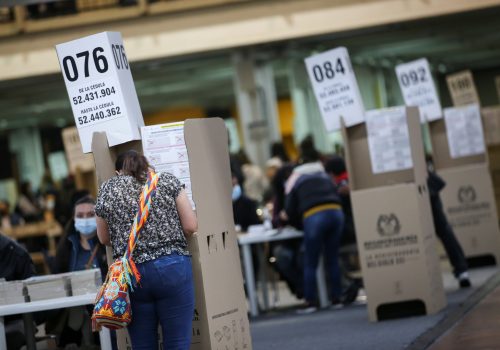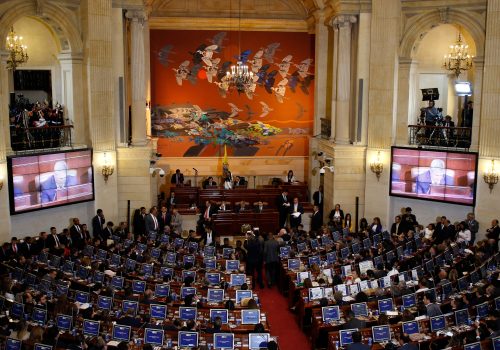Invest in diversity and inclusion
THE YEAR 2022 MARKs A REMARKABLE two hundred years of US-Colombia diplomatic relations. Through heartrending struggles and historic advances, Colombia remains one of our top strategic partners in Latin America and the Caribbean (LAC).
I have worked for more than twenty years to shape US policy to deepen our relationship with Colombia and LAC, taking on tough issues like violence, drug trafficking, human rights, and the rule of law while championing trade and peaceful solutions to economic stagnation, persistent inequality, and a lack of access to opportunities. Colombia has overcome tremendous obstacles, emerging from several domestic crises to become a country that now provides refuge to nearly two million Venezuelans fleeing declining economic conditions and political instability. Colombia holds a special place in my policy agenda—so too have the Colombian people and the country’s Caribbean and Pacific communities. In my role on the bipartisan, bicameral Atlantic Council US-Colombia Task Force, I will continue to put forward policy that supports the growth and prosperity of Colombians and LAC.
Despite notable progress in the past two decades, I am concerned about Colombia’s remaining challenges. The COVID-19 pandemic has laid bare deep economic, educational, and health disparities in Colombia, as it has in the United States. It has exposed the persistent inequities faced by those who have experienced centuries of racial and ethnic discrimination and structural inequalities. That is why, as Chair of the House Foreign Affairs Committee, I continue to advocate tirelessly for increased COVID-19 vaccine accessibility and US support for global recovery efforts.
Ignoring opportunities to address root causes and propose constructive solutions to unrest in our countries hinders our ability to open pathways to prosperity and improved quality of life for more people. While I am proud of what we have accomplished together, I place a premium on peace for a sustainable future. We will not achieve lasting peace or any great endeavor with- out the participation of Black and Indigenous communities and women in Colombia and the Western Hemisphere.
Despite making up nearly 33 percent of the population in LAC, people of African descent too often remain “invisible” and underrepresented in places of decision making, influence, and mainstream leadership. Although people of African descent and Indigenous peoples in Colombia have been resilient throughout history, these communities have been some of those most impacted by internal conflict, structural inequality, and all forms of discrimination.
Colombia has the second largest population of people of African descent in Latin America, making up nearly 11 percent of the populace. Yet, according to the United Nations Development Programme, Afro-Colombians experience higher rates of poverty (54 percent) and illiteracy (11 percent), have less access to basic services (42 percent), and face greater food insecurity (59 percent) than the rest of the population.1“Social Movements” in Comparative Perspectives on Afro-Latin America, eds. Kwame Dixon and John Burdick (Gainesville: University Press of Florida, 2012), 135-155. 2Colombia: Inclusive Economic Development, United Nations Development Programme, accessed March 1, 2022, https://www.undp.org/content/dam/undp/library/Poverty%20Reduction/MDG%20Strategies/colombia.pdf. Of the 3.4 percent of Colombians who identify as Indigenous, 63 percent live in persistent forms of structural inequality.3“Colombia Population 2022 (Live),” World Population Review, accessed March 1, 2022, https://worldpopulationreview.com/countries/colombia-population. Despite the resilience and potential of these significant Colombian com- munities on the Pacific and Caribbean coasts, the Guajira, and the Amazon, these data sound an alarm. Regardless of the optimism by many in the inter- national community who were hopeful that the 2016 peace agreement with the Revolutionary Armed Forces of Colombia (FARC) would bring peace, decrease violence, and open opportunities, challenges persist. Despite leading to the demobilization and disarmament of the FARC, full implementation of the peace agreement—particularly the ethnic chapter—remains woe- fully incomplete.
This piece of the puzzle is significant because peaceful and inclusive policies and practices are necessary conditions for attracting investment, creating new jobs, and strengthening supply chains. Most investors “recognize that the viability of business itself depends on the resources of healthy ecosystems—fresh water, clean air, robust biodiversity, productive land—and on the stability of just societies.4”Yvon Chouinard, Jib Ellison, and Rick Ridgeway, “The Sustainable Economy,” Harvard Business Review (October 2011), https://hbr.org/2011/10/the-sustainable-economy. They value societies that prioritize the critical roles youth, women, and ethnic minorities play in shaping a country’s future. As one of those main investors, the United States and I, as Chair of the House Foreign Affairs Committee, will continue to work with Colombia to ensure full implementation of the ethnic chapter in the agreement.
Sustainable peace in Colombia requires robust economic development that encompasses an intelligent trade policy and provides necessary assistance to affected communities, especially youth, Afro-Colombian, and Indigenous peoples. Economic empowerment, whether through access to viable employment or entrepreneurship, is key; it requires investment, access to resources, contacts, and capacity.
Many young people are working to change the existing narratives that place people of their communities at the bottom of the pyramid. Young entrepreneurs drive and shape innovation; they speed up structural changes in the economy and introduce new competition, thereby contributing to productivity. US–Colombia cooperation should invest in programs that can leap- frog them into new markets, leadership, and success in areas so often denied them. For this reason, I have been a strong advocate of programs that prepare Afro-Colombian and Indigenous youth for world-class education and global leadership opportunities with programs focused on fostering untapped talent. While women in Colombia have become increasingly active in paid work and elected offices, closing the gender gap at an impressive rate, Afro-Colombian women are neither experiencing similar growth nor present in positions of traditional decision making. Instead, women of African descent encounter higher levels of social and economic vulnerability, extreme poverty, and limited access to education and quality health services.5Julie Goldscheid, “Gender Violence Against Afro-Colombian Women: Making the Promise of International Human Rights Law Real,” Columbia Human Rights Law Review (May 27, 2020), http://hrlr.law.columbia.edu/hrlr-online/gender-violence-against-afro-colombian-women-making-the-promise-of-international-human-rights-law-real/. Most enter the labor market at an early age in low-income, unskilled jobs, many experience early motherhood, and others are subjected to racial and gender-based violence. Our partnerships with Colombia can and should exchange good practices and identify ways to provide targeted support for women, especially women in rural areas and ethnic communities. African descendants and Indigenous women should have access to the resources they need to build businesses, expand cooperative economic empowerment initiatives, and innovate using new and ancestral technologies. I have supported programs—funded through the Inter-American Foundation—that strengthen existing grassroots and community efforts by investing in locally-led initiatives and exchange programs, targeting resources, and providing needed sup- port for these communities beyond workshops. These efforts can and should be enhanced using public-private partnerships.
I am also committed to supporting the 2010 US-Colombian Action Plan on Racial and Ethnic Equality, an important policy complement to development assistance programs and the work and mandate of the Race, Ethnicity, and Social Inclusion Unit at the US Department of State. I am dedicated to increasing funding for State Department and US Agency for International Development (USAID) diversity hiring, retention, and promotion initiatives, and expanding opportunities for minority-owned businesses, Historically Black Colleges and Universities, and other minority-serving institutions to compete for State Department contracts and grants. I support US government efforts to hire from and build relationships with local communities, including Afro-Colombian, Indigenous, and women-led organizations and businesses.
In addition to these efforts, I have advocated for and supported USAID funding for the Afro-Colombian and Indigenous Peoples package, totaling nearly $92 million from 2011 to 2021, and the program’s successor, the Indigenous Peoples and Afro-Colombian Empowerment Activity 2021-2026, focused on the Caribbean, Pacific, and Amazon regions. I urge my colleagues on both sides of the aisle in the US Congress to prioritize these efforts and provide the necessary support to ensure targeted objectives are achieved to strengthen further the foundations of inclusive and equitable development efforts in Colombia.
Despite the many concerns facing us worldwide, the Western Hemisphere remains a central priority for the Biden Administration and Congress. We are leading through diplomacy, promoting democracy, ensuring inclusive, sustainable development, and reaffirming our firm commitment to diversity as a valuable and undeniable asset of our foreign and civil service. Democracy is precious and fragile. If it is not inclusive and we do not consider the challenges facing those at the margins, growth and prosperity for the whole are fleeting.
Throughout my career in Congress, I have encouraged an open space for new voices where regional and global power meet. In 2021, I was inspired by the launch of the Afro-Interamerican Forum on Climate Change during COP26, with leaders and scientists of African descent from twelve countries in the Western Hemisphere. The forum introduced the concept of an Afro-Descendant Natural Belt of the Americas and developed a Strategy for Environmental Equity and Racial Justice in the Amazon, inclusive of the unique perspectives and culturally-sourced solutions from African descendant communities and advocates.
In Glasgow, it became clear that without the participatory contributions of the African descendant, Indigenous communities, and women in Colombia and throughout LAC, it is unlikely we will meet our global climate goals.6Rep. Gregory Meeks, “Those on the front lines of climate change should be empowered to be central to its solution,” The Hill, December 1, 2021, https://thehill.com/blogs/congress-blog/energy- environment/583934-those-on-the-front-lines-of-climate-change-should-be/amp/. While the people who have historically inhabited the Western Hemisphere and native communities worldwide are among the most vulnerable to the climate crisis, they are also the key to our planet’s survival. It is the responsibility of those in power—including those in Congress—to make the systemic change needed to empower those most affected by climate change to be at the core of its solution.7Ibid. I believe in the tremendous potential of Colombia and the powerful ties between our nations. Colombia, its institutions, and its people are stronger when we work together to prioritize inclusive and sustainable economic development, respect for human rights, and the democratic values we cherish and aspire to uphold. I am critically optimistic about the future of Colombia because Colombia, like the United States, can elevate and lever- age the talent of our diverse populations and build relationships that tap into the cultural bonds that exist in so many communities across our nations— bonds that extend beyond borders.
* * *
Representative Gregory Meeks (D-NY) has been the congressional representative for New York’s 5th District since 1998 and is the first Black member of Congress to serve as chair of the House Foreign Affairs Committee. He is also a senior member of the House Financial Services Committee and chair- man of the Subcommittee on Consumer Protection and Financial Institutions. He is member of the Atlantic Council’s US-Colombia Task Force.
Related Allies essays
Related program

The Adrienne Arsht Latin America Center broadens understanding of regional transformations and delivers constructive, results-oriented solutions to inform how the public and private sectors can advance hemispheric prosperity.
Image: Children from the indigenous Hupda ethnic group look as their relatives get vaccinated with the Sinovac's coronavirus disease (COVID-19) vaccine, at the indigenous village of Taracua Igarape, during an operation for vaccinating indigenous communities in the Upper Rio Negro bordering Colombia, near the village of Yauarete in the Sao Gabriel da Cachoeira district of Brazil's Amazonas state, Brazil, March 3, 2021. Picture taken March 3, 2021. REUTERS/Ueslei Marcelino TPX IMAGES OF THE DAY


